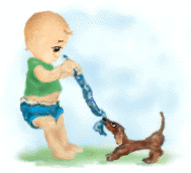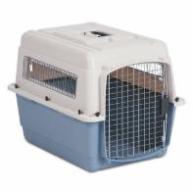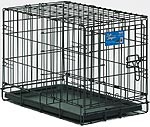
Poodles are very intelligent and easy to train. In fact, it is more a process
of the puppy training you, and not you training the puppy. Please note that
consistency is the Key no matter what method of training you use. If you do
not have your poodle puppy house broken in a matter of a couple of weeks
then YOU are probably doing something wrong.
INSIDE POTTY TRAINING
All our Poo's have used a wee-wee pad since they where
about 9-10 weeks old
(that was the age they came to live with us). The wee-wee pad is a scented pad
that attracts the puppy to it. It has an absorbent side and a blue waterproof side.
This is a great tool for training your puppy and speed up the housebreaking process.
These pads can be purchased at any
pet store's.
REMEMBER - When training your puppy that they are very young and have a little
attention span and an even smaller bladder. Keep your puppy in a small confined area
with a wee-wee pad in one end, and keep it away from the food dish and the
bed. Puppies do not like to go where they eat and sleep.Some puppies will tend to
wet on the pad but will not defecate on the pad. If you having this problem try adding
another pad to the area that they are defecating. Some puppies will refuse to walk
on a wet pad and will tend to find another place to do their business.
OUTSIDE POTTY TRAINING
Take your puppy out every hour to start with, set a timer and when it goes off
take your puppy out immediately. As the puppy grows and matures you can lengthen
time between trips. It is also smart to take
your puppy out after naps and before
and after meals. It is best you take your puppy consistently to one spot. As your
puppy becomes older and you have learned to read your puppies signs, you will be
able to tell when your puppy needs to go out. Remember, once your puppy tells you.
The average age for males to mark their territory varies from breed to
breed
and depends upon how quickly your breed and or variety reaches sexual
maturity.
For most toy breeds this is typically around 7-9 month. For larger breeds, it could
be as young as 7month but most
often its closer to 10-12 months. You may find
that some males will never mark their territory.The sooner you stop this behavior
the easier life will be. I teach my male to not lift their legs in the house and I have
several males together and I do not have an issue.I tell them in a firm voice NO !
If you have a dog that is easy to train you will find this will work quickly to
stop
the problem. Or put pennies into a tin can to make a loud rattle, this will startle
your dog and he will learn when he lifts his leg that he hears this
sound.
Dogs go through a certain TEENAGER phase around 6-8 month that will drive you
nuts and test you in every way. Do not be surprised if during this time it seems like
you have to almost start over with potty training. This phase only lasts 3-4 weeks
and everything should return to normal.
A toy poodle puppy (or any small breed puppy) really does not have full control over
bladder muscles until around 6month of age or better. A standard poodle puppy
(or any large breed puppy) on the other hand can take longer as they take longer to
fully mature than a small dog.
Well Any dog can be yappy if not properly trained. Training really is the
key.
Any dog of breed can be taught not to bark or to bark in appropriate situations.
My dogs bark once or twice when someone comes to my door, they are the best
doorbell ever invented. But more than that can become an annoyance. Especially
if you live in an apartment complex or close neighborhood.
I use the can with pennies, that works well for me. When the dog starts barking
toss the can right next to your dog, be sure not to hit your dog. The loud noise of
the pennies in the can will distract your dog from barking.
If you have an extremely shy dog I do not recommend this method.
A spray bottle with water works well too on some dogs. Be sure to only spray the
dog when the dog is barking and not when he is quiet.
Another method is to redirect your dog to more suitable activity when they start to
bark. Like giving him a chewy or favorite to play with. Be sure to reward your dog
once he has become quiet.
One of the most important phases your puppy will go through is the socialization
phase, during which he should be introduced to all sorts of different people,
animals,
sounds and objects.
The socialization phase lasts from about 3 to 12 weeks,
and what happens during this
phase is absolutely vital for a puppy living in a world full of people and other animals.
Because most puppies enter their permanent homes at about 8 weeks of age, their
caretakers have already lost about five weeks of important socialization. This is the
main reason why what happens with a breeder is so important, and why puppies from
pet stores have such a poor start. Isolated in kennels or stacked like chickens in cages
at a puppy mill, these puppies get very little human interaction during most of this critical
period.That's no way to raise a dog. Pet-store puppies usually come home with just
four weeks remaining in their socialization phase.
On the other hands, breeders who raise puppies in their homes and play with, train
and gently handle them every day make full use of these early weeks. when you bring
home the puppy at 8 weeks of age, you can then continue the breeder's good work.
During this final month of the socialization phase, puppies should attend a puppy
socialization class and meet other people and dogs in a safe, friendly and rewarding
environment.
Training Method
Hang your Poochie-Bells on the inside of the door(s) that your pooch typically
exits your house from. Your Poochie-Bell should stay on the door (or on a small
hook next to the door) at all times so that your pooch can access it whenever he/she
needs. You pooch only needs to nudge any part of the ribbon to ring the bells.
Each time you take your pooch outside for a walk, or outside for any reason; state
a simple command phrase, we suggest "Outside...Ring the Bells". Get your family
involved ! All members of your
household should be consistent and use the same wording
and actions with your pooch.
After ringing the bells and saying the command phrase, follow through with praise
to your pooch and allow him to go outside. (You should not reward your pooch with
a food treat, as the reward of going outside and praise from his favorite person is
reward enough. In adding, your pooch will then associate treats with
ringing the bell
rather than going outside) Do this each time your pooch is to go outside.
After several weeks of this conditioning, start just using the phrase each time
your pooch wants to exit and stop ringing the bells. Tell him "Outside...ring the bells",
wait for his action. Point to the bells. If he rings the bells, praise and allow him
to go out. If he does NOT ring the bells, ring the bells for him, restate your
command phrase and then allow him outside.
Each week that follows, repeat this conditioning until your pooch starts to ring
the
bells on his own. It is critical that you praise the pooch on his newly learned behavior
to reinforce this action.
Listen for the bells. you will start hearing them ring. You may be in a different room
while your pooch is ringing the bells..... go let your pooch out !
Introduced to a crate correctly, most puppies willingly accept this
den-like
confinement as part of their normal routine. Always remember that when your
puppy enters his crate, he's giving up coveted freedom, including access to you.
Make this sacrifice less objectionable by regularly throwing in a few treats, a
safe toy, chew bone, or another rewarding diversion. Feed meals inside the crate
to strengthen his favorable association.
Introducing your puppy to the crate should be positive and fun. Never place your
puppy in his crate after disciplining him. Your puppy needs to feel that his crate is
a happy, secure place. Select a command such as "in your house" and encourage him
to enter by tossing a treat/toy into the crate. Leave the door open at first.
Once
your puppy enters readily, close the door for a few minutes and praise him with a
cheerful, positive voice.
Any complaining the puppy may do at the beginning isn't usually caused by the crate
but by the controls set by this unfamiliar environment. Do not let him out when he is
whining or complaining. By doing so you will only reward his "bad" Behaviour. When the
puppy settles down for five minutes, release him from the crate. Once you feel your
puppy can be left on his own, you may practice leaving him alone fora
short periods
of time.
Puppies should not be crated for more than three hours per day. They cannot be
expected to hold their small bowels and bladders for more than a couple of hours.
Adult dogs should not be crated for more than eight hours.
9 to 10 weeks: 30 to 60 minutes
11 to 14 weeks: 1 to 3 hours
15 to 16 weeks: 3 to 4 hours 17 weeks and older: 4 to 6 hours
Adult dogs can spend half a day in a crate. Once accustomed to it, most adult
dogs can sleep in the crate at night with the door open.
Increasing free time, exercise,
and attention frequently reluctant dogs going into their crate of their own accord.

















